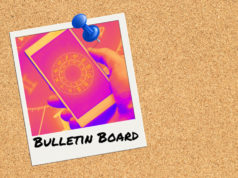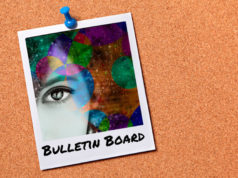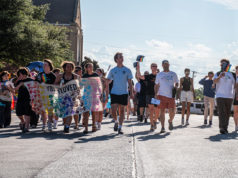A long, black sedan with deep-tinted windows stops in front of the Fort Worth Weekly office and pop icon Rick Springfield steps out wearing a black jacket over a black shirt, Hollywood thin, cool, unsmiling, distracted, and still looking like a star some 30 years after he became famous for singing “Jessie’s Girl” and portraying Dr. Noah Drake on General Hospital.
“How ya doin’, Rick?” I say, smiling broadly and sticking out my hand.
He shakes my hand and mumbles hello without making much eye contact. The driver had gotten lost on the ride over from Dallas, so maybe Springfield is rattled. I don’t know. He doesn’t seem delighted to be here.
Since we’re standing in front of the Weekly building, I ask him to pose for a photo by our newly painted sign. He complies without speaking.
Springfield is in the Metroplex promoting his new autobiography, Late, Late At Night, which I reviewed last week. He’s done tons of interviews in recent weeks. I googled the stories and it seems interviewers ask him the same tired questions over and over — questions clearly answered in his book. (From this point forward, my questions are in italics and Springfield’s answers are in quotes.)
I’ll try to ask questions you haven’t been asked a million times, I say.
“Alright,” he says, finally smiling as we settle into chairs in a conference room.
How does a high school dropout with juvenile delinquent tendencies write such an engaging book all these years later without the help of ghostwriter?
“It’s not because I was unintelligent that I dropped out of school, it was because I had lost interest,” he says of his spotty public school record while growing up in Australia. “Music took over. I was staying home from school but I was reading books. I liked horror books, in particular, and sci-fi. But they were all great writers, Arthur C. Clark, Robert Bloch… . I learned to write from them. And I’ve always traveled. That’s the best educator of all.”
In addition to living in Australia, Springfield spent part of his formative years in England and then moved to California. His accent is an interesting gumbo of all those dialects, and his voice a clear baritone with a gentle delivery. He’s much more relaxed and friendly once we settle into our conversation.
What equipment did you use in the writing process, and how did you fit writing into a schedule that includes concert tours, acting gigs, and family life?
“I used a laptop on the road,” he says. “I started on my computer in the house and when I went on the road I transferred it over to my laptop. It’s a great way to work because there are hours on planes or in airports where you’re doing nothing.”
Now that you finished your book, are you bored in airports and planes with nothing to write?
“I’m working on some stuff now,” he says. “Publishers want me to do more books and start writing fiction. I’m a writer. The only decent marks I ever got in high school were for my essays. I have a writing style and I can apply that. I just need to be connected to what I’m writing about. ”
Horror and sci-fi?
“I don’t know yet,” he says.
Why did you choose to write Late, Late At Night in the present tense, which is a little unusual for a biography?
“Yeah, I had to fight for that. I liked it because it made it immediate. It made the moments more vivid to me. It’s like I was going through them at that time. I wrote the book as a chronicle of it actually happening rather than as me remembering it.”
You study martial arts, have you ever had to use that in public? When’s the last time you had to chop somebody?
“Ummm, I’ve used a couple of judo throws but that’s all.”
At shows?
“No, no, we get a bit rowdy on the road. In the 1970s, the band members, there was one in particular, we always used to fight.”
Have you ever had to use martial arts with the public when somebody messes with you?
“No, not really. It gives you kind of a quiet confidence that people read.”
You do have a quiet confidence; it’s because of the martial arts?
“It’s part of it. I’m at the point now where I have some confidence in what I do — music and playing and acting and the things I pursue. Other times I’ll be a mental wreck. It kind of changes.”
What makes you go aaahhhhh (I throw up my hands in the air and mimic someone who I imagine is very, very happy)?
“Uhhh…you mean get mad?”
(Realizing my acting skills are not very good, I go back to using actual words.) No, what makes you get fired up, excited, crazy, happy?
“Playing live is the big draw for that. It’s a different part of me that comes out when we play live. That’s very exciting.”
You meet people all the time who are excited to see you, but who makes you feel that way?
“I was pretty excited to meet Paul McCartney. I wasn’t really an Elvis fan when I met Elvis (in the mid-1970s) but in retrospect that was cool.”
Our readers have a couple questions for you. Michelle Gilbert in Cleveland, Ohio figures it’s easier to write or sing the truth than it is to speak it, and she wonders, given such a brutally honest memoir, how did it feel to read aloud and record your own written words for the audiobook?
“It was definitely a different experience. I just actually talked to someone who had read the book and then heard the audiobook and she liked the audiobook so much more because she said she could hear my emotions in my voice, which I guess is automatic when you’re reading things that affect you. I had to stop quite a few times and try to regroup. You can definitely hear it in there, absolutely.”
Another reader, R.B. Pinokla, asked a rather odd question, but maybe you can make sense of it. I’ll read it verbatim: “I would like to know if Rick has made any connection recently with a fan that has freaked him out, basically if he has connected with a fan, not physically or sexually but mentally…per se. Maybe someone that he sees at several of his concerts and if it has affected him in some way? How has it affected him?
“Sounds pretty point specific, doesn’t it?” Springfield says with a smile.
This is obviously somebody that…, I begin, and he finishes my sentence.
“…thinks they’ve connected.”
Right.
“I connect with everybody,” he says. “I have met some fans that have become friends. But [at concerts] you’re throwing a big party and it’s not the time for deep spiritual contact. When you’re playing live it’s all pedal to the metal.”
What allows somebody to go from fan to friend?
“You just feel something, you know. You can’t put it in words. It’s a connection. Like the story of Sahara in the book.” (Rick befriended a 5-year-old girl named Sahara and her mother backstage after a concert years ago. They kept in touch and hung out on occasions. Sahara developed a brain tumor, and Springfield helped raise money for her treatments. Watch the YouTube clip below to see the girl on stage with Springfield. Sahara died at 13. Springfield wrote “Saint Sahara” for her.)
The Vietnam section of your book was really intense (Springfield and his Australian band toured Army bases in 1968 near the front lines during the war in Vietnam). I didn’t realize those kind of concerts were so common over there.
“It’s something that’s never really been represented properly.”
Have you ever thought about doing something focused on that, like a screenplay? In Apocalypse Now there’s a great scene involving a performance for the troops but it’s just a snippet.
“I have actually thought about that. It was pretty crazy over there. Some American bands were doing it too. There had been an American band that had been killed a couple of months before we got there. They were coming back from a place called Long Bihn outside Saigon. We did a show there too. They had just missed the convoy so they jumped in a jeep to catch up with the convoy and got killed by VC. It was pretty harrowing stuff.”
You’ve been a road dog for years — anything memorable ever happen to you in Fort Worth?
“I don’t always remember particular places. I’ve played so many places. You remember places like Carnegie Hall, those kinds of things.”
You mean Billy Bob’s doesn’t compare to Carnegie Hall?
“Billy Bob’s is great. Is that here?”
Yeah, it’s down in the Stockyards. (Springfield played there last year).
“Oh, I love that place. I have great memories of that place. I didn’t realize it was in Fort Worth. It’s a lot of fun to play there. The crowd is crazy.”
Anything else on your mind you want to talk about?
“No, but that was interesting talking about other stuff; I appreciate that.”
Why didn’t you kick Luke’s ass and steal Laura (I’m referring to the Luke-and-Laura coupling on General Hospital when Springfield was portraying Dr. Noah Drake in the 1980s.)
“They didn’t write it that way,” he says.
Laura was too hot for Luke, I declare, allowing room for Springfield to share his thoughts on this important matter. He just laughs.
Interview over, we exit the conference room and walk past the Weekly sales area. A few ad reps ask Springfield to pose for photos.
“I like your jacket,” one of them says.
Springfield is wearing a bad-ass embroidered jacket, looking cool as cool can be. I’m no red carpet reporter so I don’t think to ask, “Who are you wearing?”
Ad rep Kelly Wise sidles up next to Springfield, asks me to take their photo, and hands me her phone camera. As I grab it my thumb accidentally hits a button and the flash goes off. The resulting photo makes it appear as if Springfield is sneaking a peek at the lovely Wise’s frontal area, although he might have been simply admiring the fabric in her blouse.
What do you think?
After all these years, Springfield is still a cool dude and amazingly preserved for 61.
“I’m 10 years younger than you, but I look 10 years older,” I tell him.
“No you don’t,” he replies.
He’s being nice. In reality, I look 15 years older.
After posing for photos, Springfield bids farewell, heads back out to the car, and crawls inside. He’ll continue burning rubber on the highway for awhile and promoting his book, which made the New York Times Bestseller List. It’s definitely worth a read. Check it out.
















Well done, Jeff! Thanks for including my question! I don’t see many reporters who take the time to really consider their audience *and* the interviewee, and I love that you do both.
I suspect Rick was sullen precisely because he feared yet another interview where exacly the opposite occurred. It was nice to see you were able to draw him out and that he appreciated a little fresh air in the interview. At the same time, it probably takes a ton of courage to come out with a lifelong struggle with depression, knowing full well that any media appearance in which he’s a bit “off” may be fodder for psychoanalysis. I was relieved that you didn’t take this approach.
If he writes more books, guess he better get used to these book tours… though I can’t imagine they are all that different from the rounds of album promoting he’s had to do throughout his career.
Great writing, and you have gained a reader all the way up here in Ohio.
In the original post I wrote that a limo delivered Springfield to our office. It was actually a long, black sedan with tinted windows, which to my naive eyes looked like a mini-limousine. Correction made.
Great interview with thoughtful, different than average questions, including funny ones. Liked that you didn’t seem to difer to his star status.
I had written a very eloquant comment to your article, but upon saving it, realized that I had failed to enter my response to your addition question. Addition question? Are you kidding me? What brainiac thought this one up?!! It’s completely insulting and inane. You people SUCK!!!
Charlotte: I think it sucks too. I’ve written comments as well and then hit submit without doing the little math equation first. The entire effing comment gets deleted and you can’t do squat about it. I feel your pain Charlotte. And I appreciate your trying to comment on the article. You know who really sucks? The spammers that bombard sites like ours with mass marketing emails and flood comments pages with all their junk. That math equation is to try and weed out those cyber-devils.